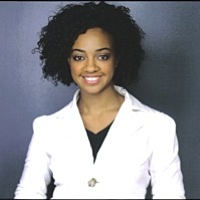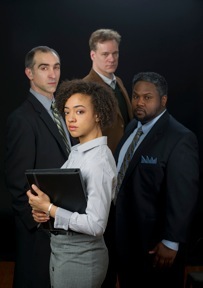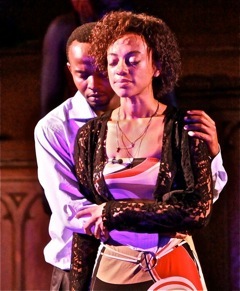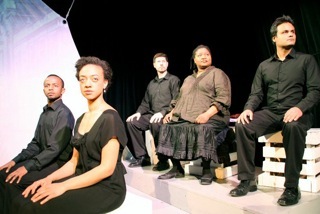Spotlight on Alumni: Beryl Bain
 Beryl Bain
Beryl BainI graduated from York in 2005 with a B.F.A in Acting. Since graduation I've had a variety of opportunities come my way. I've worked in both film and theatre as an actor. Some special projects in my career so far include: performing at the Shaw Festival for three years, playing “Susan” in the Canadian premiere of David Mamet's Race, recently playing “Nadia Beckles” in Awake, several national commercials and multiple television appearances. I've also had a bunch of jobs, done some good travelling and learning a heck of a lot since then.
What was the most valuable thing you learned while studying in Theatre at York?
Artistic discipline.
What was the most challenging aspect or experience of training/studying at York?
The lack of perspective that comes with the nature of the program and to some extent, the campus location.
What is your fondest memory of studying Theatre at York?
Lying on the studio floor. Looking into the eyes of my classmates. Wandering the York campus late at night with my friends laughing my face off.
 Beryl Bain in Race
Beryl Bain in Raceat Theatre Yes in Edmonton.
What was your favourite place at York, and why?
Once, my friend Anne and I, after hanging out in York Lanes over Falafel Hut for like 6 hours, went campus exploring. We were both like, it’s late, wanna go home? And we were both like, Nah. What part of the campus haven’t we seen before? So we went to Osgoode Hall, looked at the graduation photos of students from the early 1900’s, then we prowled around the moot courtroom. It was awe-inspiring to see these ancient photographs of all these students, and wonder what happened to them, what they went on to do. It was so random. So I’m going to say Osgoode Hall, even though I never took a single class there. Second would be Winters quad, and third is York Lanes. Fourth is Vari Hall. There are some great buildings at York!
What was one thing you enjoyed about York that was outside of the Theatre?
My anthropology course. I actually really enjoyed researching and writing papers. I liked the gym, and Winters Residence was so much fun.
 Beryl Bain in Awake!
Beryl Bain in Awake! Expect Theatre/Spark Production
What did you do for the first summer/year out of the program?
I worked at Williams-Sonoma, and wrote letters to theatres. I had meetings with my new agent and tried to find work for myself. Towards the end of the year, I got a job doing a TYA show run out of one of the city’s museums, and I think I did an insurance commercial that year too!
Do you have any advice or tips for York students just entering the dept.?
Find the people/careers/institutions that interest you before you go to school. This is my biggest piece of advice. Have a few ideas about how you would like to make your mark. Document what you dream about, be specific and carry examples with you. Bring with you a strong idea of what YOU would like to get out of the program, and what you think YOU need to achieve your goals. This will change, but at least you come to the program with a strong idea. You should certainly be flexible to the ideas and knowledge that the program has to offer, but do not, do not forget the dreams that brought you to the program in the first place. You will need them in the future, no matter which path you end up taking.
 Beryl in I, Marcus Garvey
Beryl in I, Marcus GarveyTheatre Archipelago/b current
Do you have any advice or tips for York students just about to graduate? about to join the job market?
Oh my God lots. Advice I’m constantly practicing. It’s an ongoing thing.
Same as above, remember your interests. Remember what struck you about this profession you’d like to pursue. Keep tangible examples close to you at all times, absolutely anything that lights your fire.
Because I am currently a professional actor, I have lots of advice that I can pass on to recent grads that was useful to me. My apologies if it isn’t particular to your stream, however I think that most of it is useful for all self-employed people no matter what you’re doing.
1. Stay in practice. This cannot be stressed enough. Whatever your inclination is, do it whether you are being hired right now or not. There are lots of ways to do this without paying lots of money. For example, a group of friends can be a mock audition panel for themselves, or shoot scenes in the living room. Classes are very useful of course, but remember that you don’t always have to be a student to learn. Remember, if you don’t find what you’re looking for, you have to make it.
2. Ask people questions, as many professionals as you can. Don’t be afraid to call up the people you admire. The worst they can say is no.
3. Get organized. You are self-employed. My experience is, in order to be self employed, you need to alternate between the big picture (the vision of your career I mentioned earlier) and the details. Most resources for self-employed people apply to you, including money management and taxation information. Practice tracking everything. What you auditioned for, what worked, what didn’t. Details about the production you are auditioning for. Wear the right clothes (tip: you don’t have to buy them, keep the tags on!) do your hair and makeup according to the type of thing you are going out for. Track what shows you see. Track your business expenses, keep your receipts, track what money’s coming in and what’s going out. Etc. The tracking helps you run your career like a proper business. That’s what I mean by details.
4. Ok so about money. You may want to watch your attitude towards money. Bottom line is, being solvent is really important, and ultimately more relaxing in my opinion, but you don’t have to let either extreme tyrannize you. (For example, oh my God, I can’t work a joe job, I’ll have no time for my art and I’m better than that, and that’s what credit cards are for or the other extreme Oh my God, I’m still working in this shitty job because no one will hire me because I have no talent and mea culpa the world is awful I think it’s safe to say that most actors have experienced these extremes and both are wrong. Find a balance and find it now.) Stay focused on goals and pay your bills. You’ll have to do both. Find a way. Treat every job, even the shitty ones, with respect. Ask other artists what jobs they do if you need more income, communicate honestly about your artistic life with your employers, be disciplined about your craft, and you’ll be fine.
5. About attitude. You’ll have to walk a fine line between getting discouraged and being unrealistically confident. You have to have confidence and perseverance, but a lot of the time, the struggle of the actor is over emphasized, often by people who secretly wish they’d given it a try. You will likely struggle, but it doesn’t mean you have to buy into the whole starving artist thing. This is a choice. You will give it your absolute all, meaning you will work on your craft, keep your ear to the ground, work on your self-image, whatever YOU want it to be, and give it your damn all. You have to enjoy it relentlessly. Don’t be a whiner. Ultimately, nobody has a gun to your head, right? You’re choosing this.
If you had the chance to go back and visit your younger self as you were beginning at York, what advice would you give yourself?
Do. Not. Gossip. The program, who gets in and who doesn’t, absolutely does NOT matter. I have to say, I regret any amount of time I spent talking about that stuff. People matter, politics truly don’t. Personally, I would have told myself to stay focused. I figured it out eventually.
Did connections, friendships, relationships you made at York help you afterward?
Yes. I worked with many Yorkies after school.
In which ways has your education at York, and in Theatre in particular, helped you in work and life?
I suppose the most prominent thing would be that people take you more seriously as an artist if you’ve studied. It helped get those early auditions and agents that helped me get my start.
Can you tell us a story of a moment where your training at York was clearly useful?
Working at the Shaw Festival, I was familiar with the vocal exercises that our coaches used. I knew IPA!
What did you learn at York that has been of greatest value?
Feel your feet on the floor.
What did you NOT get taught at York that you wish you had been taught?
More physical theatre might have been useful. Generally I would say more scene work, earlier on so that the exercises we study can be put to practice. Ultimately, you should be in school to practice your face off.
I might also suggest that professional confidence might have been more emphasized for each individual person in the acting stream. (I don’t mean arrogance, by the way, I mean confidence). I remember their being a great deal of emphasis on casting, even in the earlier years, which I now profoundly disagree with. Here’s the thing. School should be for practice of craft. You don’t need to practice getting cast or how to get cast . It is beyond your control, and frankly, it isn’t what you’re paying to learn. Ideally, one should leave school having practiced to death whatever it is they have to offer. It’s quite an important that an actor have genuine confidence, as well as generosity. You should leave school confident that you have something to give. Focus on your own growth and improvement, your own image and your own skills.